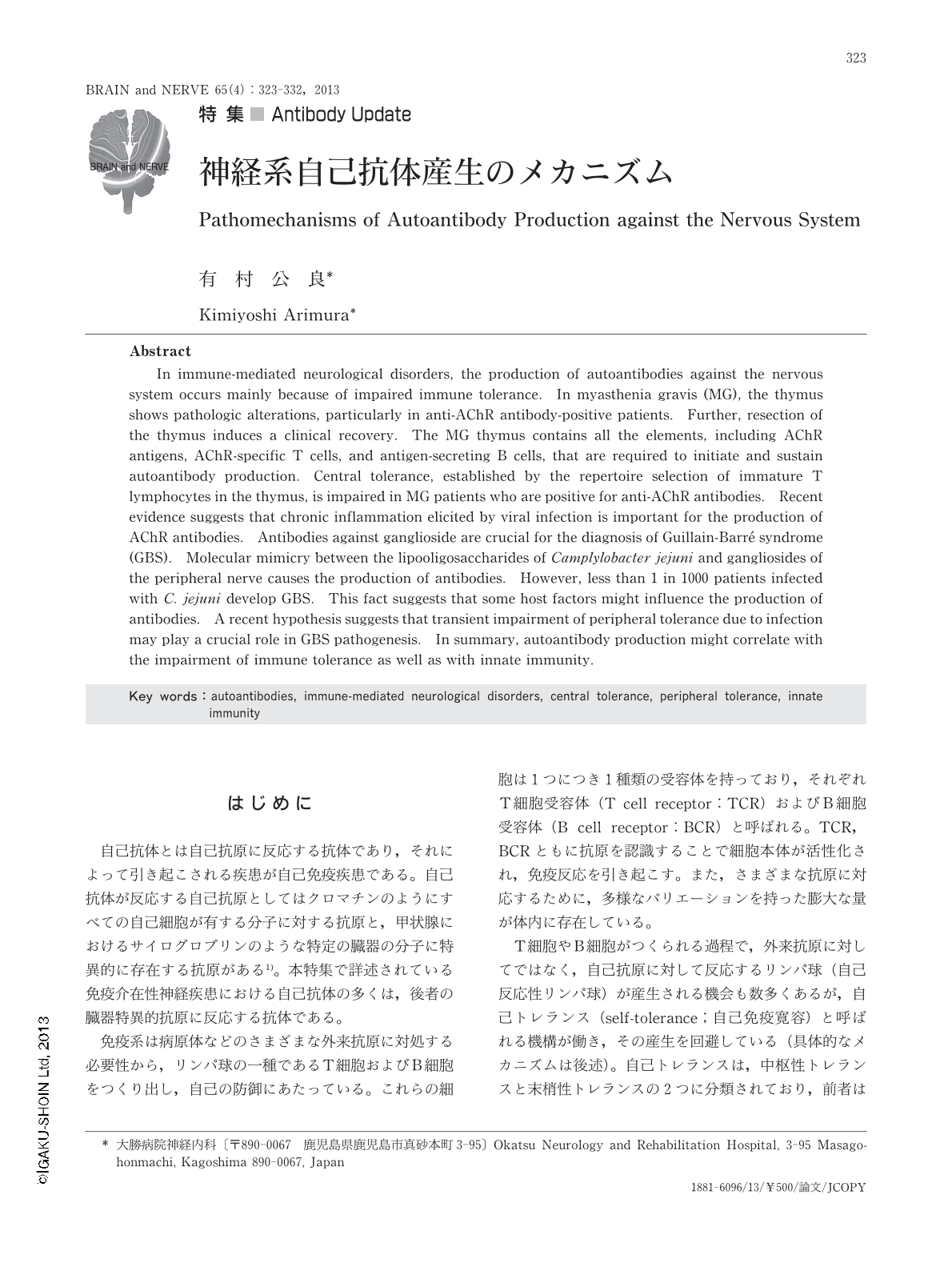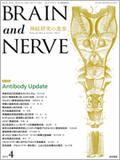Japanese
English
- 有料閲覧
- Abstract 文献概要
- 1ページ目 Look Inside
- 参考文献 Reference
はじめに
自己抗体とは自己抗原に反応する抗体であり,それによって引き起こされる疾患が自己免疫疾患である。自己抗体が反応する自己抗原としてはクロマチンのようにすべての自己細胞が有する分子に対する抗原と,甲状腺におけるサイログロブリンのような特定の臓器の分子に特異的に存在する抗原がある1)。本特集で詳述されている免疫介在性神経疾患における自己抗体の多くは,後者の臓器特異的抗原に反応する抗体である。
免疫系は病原体などのさまざまな外来抗原に対処する必要性から,リンパ球の一種であるT細胞およびB細胞をつくり出し,自己の防御にあたっている。これらの細胞は1つにつき1種類の受容体を持っており,それぞれT細胞受容体(T cell receptor:TCR)およびB細胞受容体(B cell receptor:BCR)と呼ばれる。TCR,BCRともに抗原を認識することで細胞本体が活性化され,免疫反応を引き起こす。また,さまざまな抗原に対応するために,多様なバリエーションを持った膨大な量が体内に存在している。
T細胞やB細胞がつくられる過程で,外来抗原に対してではなく,自己抗原に対して反応するリンパ球(自己反応性リンパ球)が産生される機会も数多くあるが,自己トレランス(self-tolerance;自己免疫寛容)と呼ばれる機構が働き,その産生を回避している(具体的なメカニズムは後述)。自己トレランスは,中枢性トレランスと末梢性トレランスの2つに分類されており,前者はT細胞やB細胞がつくり出される一次リンパ組織(胸腺・骨髄)で行われ,後者は一次リンパ組織でつくられたT細胞やB細胞が免疫系の働きをみせる二次リンパ組織(リンパ節など)で行われる。自己免疫疾患の発症にはこれらの自己トレランスの破綻が関与しており,その破綻の原因としてさまざまな因子が考えられている2)(Table1)。
しかし実際には,ほとんどの免疫介在性神経疾患における自己抗体の産生機序はまだ十分に明らかにはなっていない。その中で比較的研究が進んでいるのは,中枢性トレランスの異常が主体の重症筋無力症(myasthenia gravis:MG)と末梢性トレランスの異常と関連する分子相同性(molecular mimicry)機序が明らかになっているギラン・バレー症候群(Guillain-Barré syndrome:GBS)であろう。本稿ではこの2つの疾患を中心に自己抗体の産生機序について,最近の知見をまとめてみた。
さらに,ほとんどの免疫介在性神経疾患は後天性であり,自己トレランスの異常を起こす引き金となる免疫異常の発症が必要となる。近年ウイルス,細菌などの外来抗原に対する自然免疫(innate immunity)が自己免疫疾患の引き金になっていることが示唆されており,この点についても触れたい1)。ただ筆者は免疫学の専門家ではないので,免疫学的な詳細は文献を参照していただきたい。
Abstract
In immune-mediated neurological disorders, the production of autoantibodies against the nervous system occurs mainly because of impaired immune tolerance. In myasthenia gravis (MG), the thymus shows pathologic alterations, particularly in anti-AChR antibody-positive patients. Further, resection of the thymus induces a clinical recovery. The MG thymus contains all the elements, including AChR antigens, AChR-specific T cells, and antigen-secreting B cells, that are required to initiate and sustain autoantibody production. Central tolerance, established by the repertoire selection of immature T lymphocytes in the thymus, is impaired in MG patients who are positive for anti-AChR antibodies. Recent evidence suggests that chronic inflammation elicited by viral infection is important for the production of AChR antibodies. Antibodies against ganglioside are crucial for the diagnosis of Guillain-Barré syndrome (GBS). Molecular mimicry between the lipooligosaccharides of Camplylobacter jejuni and gangliosides of the peripheral nerve causes the production of antibodies. However, less than 1 in 1000 patients infected with C. jejuni develop GBS. This fact suggests that some host factors might influence the production of antibodies. A recent hypothesis suggests that transient impairment of peripheral tolerance due to infection may play a crucial role in GBS pathogenesis. In summary, autoantibody production might correlate with the impairment of immune tolerance as well as with innate immunity.

Copyright © 2013, Igaku-Shoin Ltd. All rights reserved.


